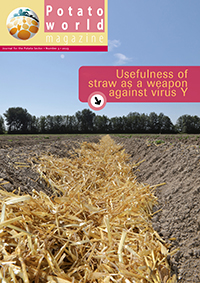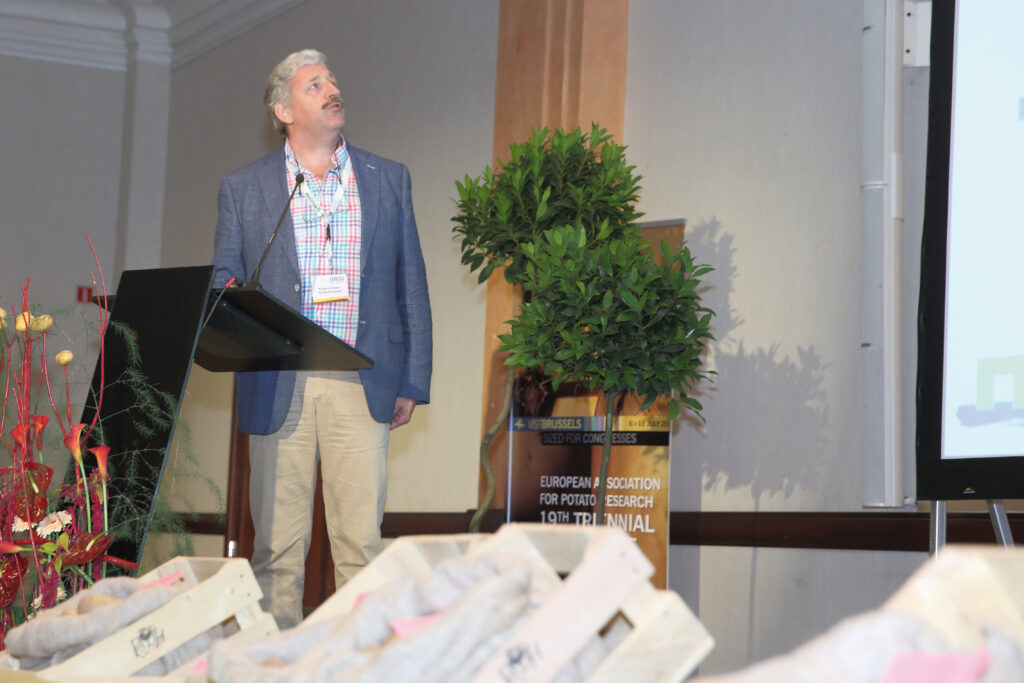Already a subscriber? Activate your premium account

Potatoworld Magazine

To find out what is new in potato research attending the 19th triennial conference of the European Association of Potato Research (EAPR) in Brussels and the 98th annual meeting of Potato Association of America (PAA) in Spokane both in July this year is most helpful.
I was present at both and noticed that the selection of key note addresses, subjects of sessions and workshops shows trends. Subjects as soil fertility and seed physiology have moved to the background More important have become new insights and possibilities of advanced genetic techniques and global issues such as climate change, sustainability, food security, human health and new pests and diseases such as zebra chips. Without being exhaustive I now show some highlights .
André Deveaux of the International Potato Center, CIP based in Lima, Peru with a global potato network noted that the potato with an annual production of 374 million tons per year has become the third food crop after wheat and rice. Recent increases are due to the strong increase in China and India and in Subsaharan Africa so potato is playing a crucial role in feeding the world’s population. Developing and spreading pro-poor technologies such as adapted and resistant varieties and low tech seed propagation techniques will contribute to the rise of potato as staple for the poor. In Spokane I raised the sustainability implications of potato becoming a global commodity.

Richard Visser of Wageningen University presented results of the potato genome sequence. Costs of sequencing have come down dramatically so many more genetic markers became available for individual alleles greatly enhancing possibilities for marker assisted breeding. David Douches of the Michigan State University added that global cooperation in the Solcap project yielded 25,000 markers allowing a genetic description of 250 North American varieties and breeding lines. Genetic modification also gradually receives more attention with many presentations on introduction of resistance genes of wild species into existing varieties such as by Godelieve Gheijsen of the University of Ghent who announced that a consortium of Belgium institutions and companies wants to have ready a multiple late blight resistant variety Bintje by 2018. Marc Ghislain of CIP plans the same for tropical Africa and currently prepares field trials in Uganda. Jack Vossen of Wageningen University spoke in Brussels and I in Spokane about progress and challenges to create cisgenic dynamic late blight varieties within the DuRPh (Durable Resistance against Phytophora) approach. Simplot presented its company approach “Innate” to bring genetically modified Russet Burbanks resistant to bruising, virus Y and late blight to the market.
Nora Olsen of the University of Idaho gave a global perspective of potato storage management where traceability is a must and where resources in both resource rich and poor environments must be used optimally for reasons of sustainability. Location driven storage structures and management including innovative sprout and disease control where plant based essential oils play a role, monitoring devices variable frequency vanning and evaporative cooling are all increasingly playing a role. Aymeric Goyer of the Oregon University showed considerable differences in storage bruise and water loss – shrinking – between seven Russet varieties showing scope for genetic improvements as well.
In Brussels a dedicated workshop took place on the subject and Athyna Cambouris of Agriculture Canada delivered a key note address there on the subject stating that the potato crop is particularly suited for this approach due to the high costs of the inputs land, seed, fertilizer, pesticides, irrigation, labour and machinery. For spatio-temporal application of inputs needed is knowledge (when, where, dose), understanding (why) and the method variable rate application of management zone.
Just a few examples of hundreds of oral presentations and posters, the websites www.paa and www.eapr show all authors and titles.
Anton Haverkort
antonhaverkort@wur.nl
Events
©2015 - 2024 Potatoworld | Webdesign and realisation COMMPRO